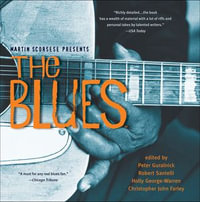
At a Glance
eText
$54.95
or
Instant online reading in your Booktopia eTextbook Library *
Read online on
Desktop
Tablet
Mobile
Not downloadable to your eReader or an app
Why choose an eTextbook?
Instant Access *
Purchase and read your book immediately
Read Aloud
Listen and follow along as Bookshelf reads to you
Study Tools
Built-in study tools like highlights and more
* eTextbooks are not downloadable to your eReader or an app and can be accessed via web browsers only. You must be connected to the internet and have no technical issues with your device or browser that could prevent the eTextbook from operating.
Black Music Matters: Jazz and the Transformation of Music Studies is one of the first books to promote the reform of music studies with a centralized presence of jazz and black music to ground American musicians in a core facet of their true cultural heritage. Ed Sarath applies an emergent consciousness-based worldview called Integral Theory to music studies while drawing upon overarching conversations on diversity and race and a rich body of literature on the seminal place of black music in American culture.
Combining a visionary perspective with an activist tone, Sarath installs jazz and black music in as a foundation for a new paradigm of twenty-first-century musical training that will yield an unprecedented skill set for transcultural navigation among musicians. Sarath analyzes prevalent patterns in music studies change discourse, including an in-depth critique of multiculturalism, and proposes new curricular and organizational systems along with a new model of music inquiry called Integral Musicology. This jazz/black music paradigm further develops into a revolutionary catalyst for development of creativity and consciousness in education and society at large.
Sarath’s work engages all those who share an interest in black-white race dynamics and its musical ramifications, spirituality and consciousness, and the promotion of creativity throughout all forms of intellectual and personal expression.
Combining a visionary perspective with an activist tone, Sarath installs jazz and black music in as a foundation for a new paradigm of twenty-first-century musical training that will yield an unprecedented skill set for transcultural navigation among musicians. Sarath analyzes prevalent patterns in music studies change discourse, including an in-depth critique of multiculturalism, and proposes new curricular and organizational systems along with a new model of music inquiry called Integral Musicology. This jazz/black music paradigm further develops into a revolutionary catalyst for development of creativity and consciousness in education and society at large.
Sarath’s work engages all those who share an interest in black-white race dynamics and its musical ramifications, spirituality and consciousness, and the promotion of creativity throughout all forms of intellectual and personal expression.
Industry Reviews
Jazz musician, scholar, and educator Ed Sarath (Univ. of Michigan) offers an engaging study of jazz music as inextricably linked to black heritage and race relations in the US; improvisation and creativity within the arts, primarily music; and, most significantly, the need to restructure music curricula in public schools. Sarath situates this restructuring with regard not only to jazz but also to other improvised, non-Western musics. The book has two main sections—"Jazz and the Creativity Turn" and "Jazz and the Consciousness Turn"—but, as Sarath points out, the “closely intertwined nature of creativity and consciousness is evident throughout” the book. In the introduction, he submits that “lower order” change in music education has, to date, amounted to adding “improvisation, composition, and engagement with diverse musical traditions” to the existing pedagogical framework. He asserts that a “higher order” vision should stem from rebuilding the entire “learning enterprise”—a restructuring that would examine issues including diversity, integrative learning, embodied musicianship, and entrepreneurship. Sarath also argues that learning models should focus more on creativity and less on students as “interpreters” who occasionally improvise and compose. The endnotes and bibliography are extensive.
Summing Up: Recommended. Upper-division undergraduates through faculty and professionals.
Summing Up: Recommended. Upper-division undergraduates through faculty and professionals.
Read online on
Desktop
Tablet
Mobile
ISBN: 9781538111710
ISBN-10: 1538111713
Published: 15th August 2018
Format: ePUB
Language: English
Audience: Professional and Scholarly
Publisher: Rowman & Littlefield Publishing Group























